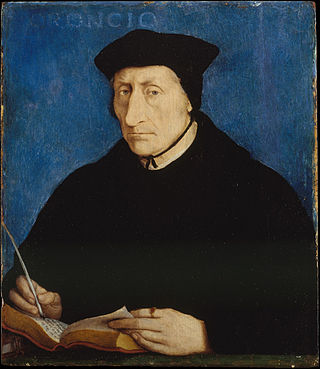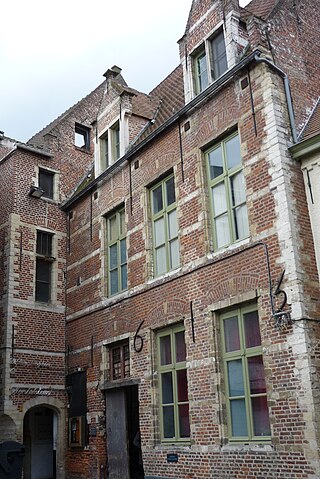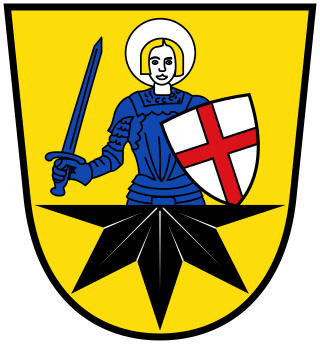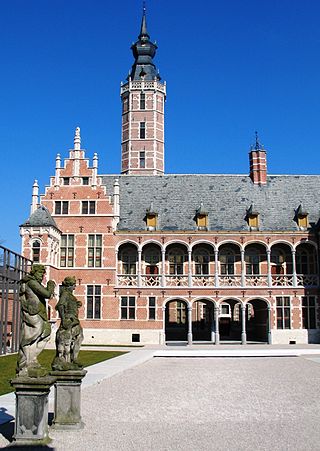Life
Little is known of his youth, except that as a child he attended the school of humanist Alexander Hegius von Heek in Deventer. In November 1510 he enrolled at the University of Cologne, and later moved on to Old University of Leuven. He became Master of Arts on 10 November 1515, and then supported himself by private teaching. In 1518 he was ordained to an ecclesiastical benefice. In October 1519, he succeeded Adrianus Barlandus as Latin teacher at the Collegium Trilingue, where he taught Jacob Cruucke and Andreas Masius who would later become notable humanists in their own right. [2] He kept this chair until his death in 1539, after which he was succeeded by Petrus Nannius. [3] As a Latin scholar, he was responsible for educating an entire generation of excellent Latin scholars. [4]
Although originally he did not support his candidacy, Erasmus quickly became fond of Goclenius. He praised his mastery of classical languages and teaching in many of his letters (including one to Thomas More). When Erasmus moved to Basel in autumn 1521, Goclenius became his agent and trusted man in Leuven and the Low Countries. Erasmus had originally intended to quickly return to Leuven, though he never did.
This is Goclenius to whom Erasmus told his autobiography (Compendium vitae) in 1524. [5] He also authorized him to conduct a general edition of his works. In May 1519, Goclenius had composed a metrical version of the catalog of the works of the great writer, lucubrationum Erasmicarum elenchus. When Erasmus believed himself close to death, it was to Goclenius that he entrusted his will, [6] in which he entrusted a considerable sum to Goclenius. [7]
In April 1525 he was appointed canon of the Cathedral of Our Lady in Antwerp (through jus nominationis granted by Pope Leo X in the liberal arts faculty of Leuven), but the nomination was contested, and a very long trial followed. In 1534, with his friend the Polish diplomat and humanist Johannes Dantiscus, he was appointed provost of the cathedral chapter of Hoegaarden. In July 1536, he assumed provisional leadership of the Collegium Trilingual after the death of its chairman Joost van der Hoeven.
Goclenius enjoyed considerable reputation in his time: in his lifetime he was proposed to succeed Juan Luis Vives at Corpus Christi College, Oxford, but ultimately remained in Leuven until his death. From his pulpit and in the Latin literature of the Collegium Trilingue, he had a great influence on the humanistic culture of the sixteenth century. Portuguese father of archaeology André de Resende dedicated his Encomium urbis et academiæ Lovaniensis (1530) to Goclenius.
Works
He wrote a Latin version of the Hermotimus, sive De sectis philosophorum of Lucian, dedicated to Thomas More (Louvain, D. Martens, 1522), for which More gave him a gilded cup full of gold pieces. [8] Then he jointly wrote, with Erasmus, an edition of philosophical dialogues of Cicero: M. Tullii Ciceronis Officiorum libri III. De amicitia. De senectute. Paradoxa. Somnium Scipionis. De senectute & Somnium Scipionis etiam Theodori Gazæ versione. Omnia denuo vigilantiori cura recognita per Des. Erasmum Rot. & Conradum Goclenium, deprehensis ac restitutis aliquot locis non cuilibet obviis (Bâle, J. Froben, 1528). He also published an edition of the Pharsalia of Lucian (Anvers, M. Hillen, 1531).

Rodolphus Agricola was a Dutch humanist of the Northern Low Countries, famous for his knowledge of Latin and Greek. He was an educator, musician, builder of church organs, a poet in Latin and the vernacular, a diplomat, a boxer and a Hebrew scholar towards the end of his life. Today, he is best known as the author of De inventione dialectica, the father of Northern European humanism and as a zealous anti-scholastic in the late fifteenth century.

Guillaume Budé was a French scholar and humanist. He was involved in the founding of Collegium Trilingue, which later became the Collège de France.

The Collegium Trilingue, often also called Collegium trium linguarum, or, after its creator Collegium Buslidianum, was founded in 1517 under the patronage of the humanist, Hieronymus van Busleyden. The three languages taught were Latin, Greek and Hebrew. It was the model for the Collège de France founded in 1530. It is located in Leuven, Belgium.

Alexander Hegius von Heek was a German humanist, so called from his birthplace Heek.
Adriaan van Baarland or Adrianus Barlandus or Hadrianus Barlandus (1486–1538) was a Dutch historian of merit. He was born in the village of Baarland, from which he took his name. He studied at Ghent and Leuven, at which latter place he was elected professor of eloquence at the Collegium Trilingue in 1526, after a stay of some years in England. He died in Leuven in 1538, and was succeeded at the Collegium Trilingue by Conrad Goclenius.

Niccolò Perotti, also Perotto or Nicolaus Perottus was an Italian humanist and the author of one of the first modern Latin school grammars.

Jacobus Latomus was a Catholic Flemish theologian, a distinguished member of the Faculty of Theology at the University of Leuven. Latomus was a theological adviser to the Inquisition, and his exchange with William Tyndale is particularly noted. The general focus of his academic work centered on opposing Martin Luther and the Protestant Reformation, supporting the papacy and the hierarchy of the Catholic Church. Etymology: Latinized Latomus = Masson from Greek lā-tómos 'stone-cutter, quarryman', thus 'mason'.

Mengeringhausen is a village and a municipal district of Bad Arolsen in Waldeck-Frankenberg, in Hesse, Germany. Its population is estimated to be 3,800 people. It was first mentioned as the town 'Stadt Mengeringhausen' in 1234. The town was in possession of sovereign principality Waldeck.

Hieronymus van Busleyden was a patron of learning and a humanist from the Habsburg Netherlands. His name is usually partially Latinized in English, and can also appear as Hieronymus Busleyden or fully Latinized as Hieronymus Buslidius.
Petrus Vulcanius otherwise Pieter De Smet was a humanist scholar and local government official of Bruges.
Jan Was or Waes, Latinized Johannes Vasaeus was a Flemish humanist, teacher and historian, who spent his working life in Spain and Portugal.
Germain de Brie, sometimes Latinized as Germanus Brixius, was a French Renaissance humanist scholar and poet. He was closely associated with Erasmus and had a well-known literary feud with Thomas More.
Paolo Marsi or Paolo Marso, in Latin Paulus Marsus or Paulus Marsus Piscinas (1440–1484) was an Italian humanist and poet known primarily for his commentary on the Fasti of Ovid.

Alardus or Alaard of Amsterdam (1491–1544) was a Dutch humanist scholar, known as an editor of Rodolphus Agricola and Erasmus.

Jacob Cruucke or Jacob van Cruyck, also known by his Latinized name Jacobus Cruquius and in French-language literature as Jacques de Crucque was a Flemish humanist, philologist, and scholar of the 16th century. He is mainly known for his publications on the works of the Roman lyric poet Horace based on ancient manuscripts kept in the library of a local monastery, since lost to fire.

Cornelis de Schepper, Cornelis Duplicius de Schepper or Cornelius de Schepper (1503?-1555) was a Flemish mathematician, counselor and ambassador for the Holy Roman Emperor Charles V, Ferdinand I of Austria and Mary of Hungary, governor of the Netherlands. He is also known by his Latin name Scepperus.

Petrus Nannius was a Dutch poet, accomplished Latin scholar and humanist of the 16th century. A contemporary of Desiderius Erasmus, he was born in Alkmaar and was an important figure in the humanism of the time, having provided a foundation with his teaching for the later flowering of humanism in the region.

Frans van Cranevelt, also known as Franciscus Craneveldius, was a Flemish humanist and lawyer.

Martinus Dorpius or Maarten van Dorp (1485–1525) was a humanist and a theologian at the Old University of Leuven. He is best known as a friend and correspondent of Erasmus.
Hendrik Alfons De Vocht (1878–1962), sometimes Henry or Henri, was a pioneer in the academic study of Renaissance Latin texts from the Low Countries.












